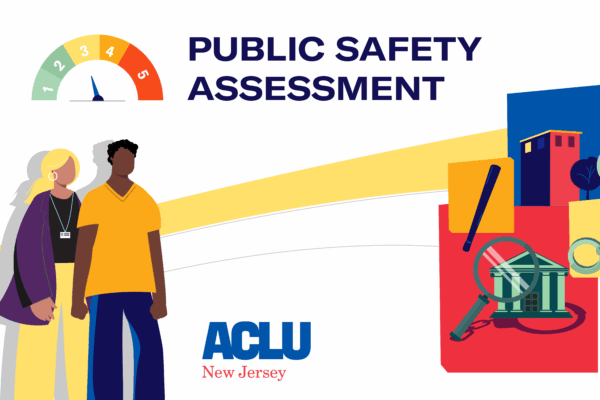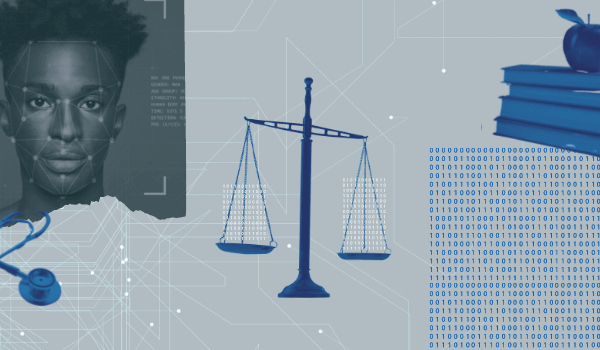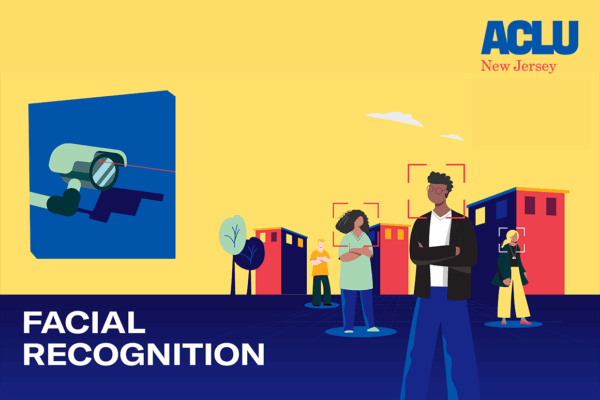Cuando alguien es acusado de un delito y arrestado, el juez debe decidir si dicta la prisión preventiva. Si la persona es obligada a permanecer en prisión, va a ser cada vez más difícil no aceptar un acuerdo de reducción de sentencia (y enfrentar las consecuencias posteriores) incluso si los cargos imputados en su contra son injustos. Las personas que están en prisión previo al juicio también reciben sentencias mucho más duras si son declaradas culpables. Si se les permite luchar contra sus cargos desde su casa, lo más probable es que obtengan un resultado mucho más justo. Esto hace que la decisión de determinar la libertad antes del juicio sea una de las más relevantes para el caso de una persona; y en Nueva Jersey, el sistema jurídico penal depende de los algoritmos para tomar esa decisión.
Sobre la Evaluación de la Seguridad Pública (PSA)
En 2017, después de la abolición de la fianza en efectivo, Nueva Jersey adoptó un algoritmo para evaluar el riesgo previo al juicio llamado Public Safety Assessment (Evaluación de la Seguridad Pública), o PSA, para informar si la persona debe ser detenida previo al juicio.
"Las personas que están en prisión previo al juicio también reciben sentencias mucho más duras si son declaradas culpables. Si se les permite luchar contra sus cargos desde su casa, lo más probable es que obtengan un resultado mucho más justo."
La PSA mide dos aspectos del nivel de “riesgo” del acusado en una escala del uno al seis (qué tan probable es que las personas no comparezcan en futuras citas judiciales y hasta qué punto podrían correr el riesgo de ser arrestadas de nuevo. La PSA también proporciona una “alerta” si calcula un riesgo elevado de que una persona pueda ser arrestada de nuevo por un delito de violencia. El sistema actual de Nueva Jersey asume que las personas tienen derecho a permanecer en libertad mientras luchan contra sus cargos y sólo pueden ser detenidas si un juez, informado por la PSA, considera que no pueden ser puestas en libertad sin riesgos a la comunidad.
Las preocupaciones sobre los algoritmos como la PSA
Estos tipos de algoritmos para evaluar el riesgo previo al juicio han sido objeto de un escrutinio riguroso en los últimos años, y por buena razón, ya que pueden perpetuar el sesgo racial según evalúan el riesgo. Las personas de color, que tienen más probabilidades de ser arrestadas que las personas blancas y de obtener sentencias mucho más largas por los mismos delitos, con seguridad recibirán puntajes de riesgo más altos (un resultado de décadas de racismo sistemático y de un exceso de vigilancia selectiva de las comunidades negra y morena, contexto que la propia evaluación ignora).
Esto se relaciona directamente con las preguntas más apremiantes del Proyecto de Injusticia Automatizada: ¿puede un algoritmo, que sólo tiene en cuenta nueve factores del acusado, cumplir con el debido proceso garantizado en la constitución? Y además, ¿la vida de una persona debería reducirse a un número en una página (una evaluación no exhaustiva de la realidad) cuando su libertad está en juego?
Nuestra interpretación de estas preguntas esenciales está fundamentada en lo que hemos visto en Nueva Jersey, que implementó la PSA por primera vez en 2017 con el objetivo de eliminar la fianza en efectivo en la mayoría de los casos penales. ¿Cuál ha sido el impacto de este cambio masivo de la fianza en efectivo? ¿Y cómo la PSA ha afectado a ese panorama?
La experiencia de Nueva Jersey con la PSA
Desde la eliminación de la fianza en efectivo y la adopción de la PSA en 2017, Nueva Jersey ha reducido de forma drástica su población carcelaria sin costo alguno para la seguridad pública. Los acusados siguieron compareciendo ante el juez sin aumento de la criminalidad, y ahora pasan menos tiempo en prisión. Esto indica que la abolición de la fianza en efectivo en Nueva Jersey fue todo un éxito (encarcelar a personas antes de que sean condenadas es cruel e innecesario).
"Los defensores del algoritmo para evaluar el riesgo previo al juicio tenían la esperanza de que las decisiones fueran tomadas libres de prejuicios, a diferencia de los jueces humanos, pero eso no es lo que está pasando."
Sin embargo, la PSA no ha abordado el sesgo sistemático racial de las personas que están detenidas esperando su juicio. Antes de la reforma de la fianza y la adopción de la PSA, los acusados de la comunidad negra representaban el 54 % de la población carcelaria de Nueva Jersey. En la actualidad, cinco años después, esa cifra sigue siendo la misma a pesar de que la población carcelaria fue reducida de forma drástica. Los defensores del algoritmo para evaluar el riesgo previo al juicio tenían la esperanza de que las decisiones fueran tomadas libres de prejuicios, a diferencia de los jueces humanos, pero eso no es lo que está pasando.
La experiencia de Nueva Jersey en usar la PSA enfatiza la necesidad de una regulación integral y una supervisión de los algoritmos del gobierno y de los sistemas de decisión automatizadas. El gobierno debería tener la obligación de evaluar en todo momento los algoritmos en los que confía para entender mejor su impacto en las comunidades marginadas, (y estos sistemas no deberían estar protegidos del escrutinio público y de la responsabilidad). Algunos estudios ya han analizado el funcionamiento de la PSA, pero entender su impacto y los efectos de los sistemas como éste es un proyecto esencial que necesita apoyo.
Sólo cuando esté acompañado de una infraestructura sólida de supervisión que regule su uso, podríamos empezar a considerar la incorporación de algoritmos para las decisiones que afectan cosas tan importantes que pueden impactar la vida de una persona, como los derechos civiles de las personas y sus libertades civiles.
Nosotros tenemos derecho a saber que el gobierno nos está tratando de forma justa y con dignidad. Las nuevas tecnologías como los algoritmos y los sistemas de decisión automatizados no son la excepción.




